新概念英语第二册复习笔记 第七课 单词学习
- 格式:doc
- 大小:48.50 KB
- 文档页数:5
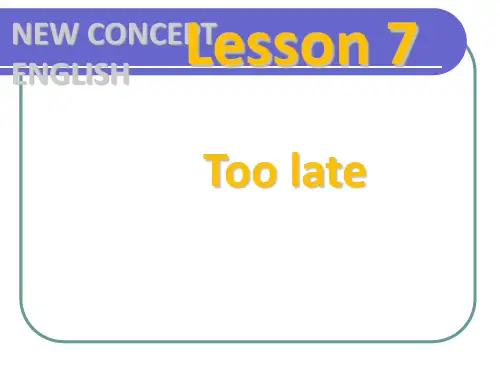
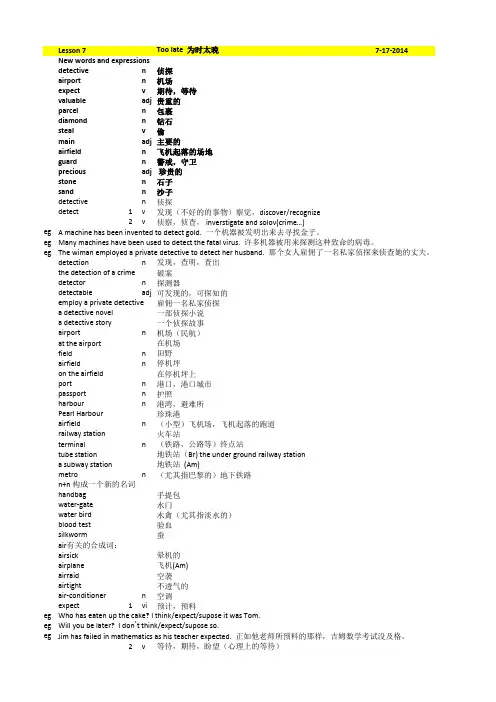
Too late 为时太晚Lesson 77-17-2014New words and expressionsdetective n侦探airport n机场expect v期待,等待valuable adj贵重的parcel n包裹diamond n钻石steal v偷main adj主要的airfield n飞机起落的场地guard n警戒,守卫precious adj珍贵的stone n石子sand n沙子detective n侦探detect1v发现(不好的的事物)察觉,discover/recognize2v侦察,侦查, inverstigate and solov(crime…)eg A machine has been invented to detect gold. 一个机器被发明出来去寻找金子。
eg Many machines have been used to detect the fatal virus. 许多机器被用来探测这种致命的病毒。
eg The wiman employed a private detective to detect her husband. 那个女人雇佣了一名私家侦探来侦查她的丈夫。
detection n发现,查明,查出the detection of a crime破案detector n探测器detectable adj可发现的,可探知的employ a private detective雇佣一名私家侦探a detective novel一部侦探小说a detective story 一个侦探故事airport n机场(民航)at the airport 在机场field n田野airfield n停机坪on the airfield 在停机坪上port n港口,港口城市passport n护照harbour n港湾,避难所Pearl Harbour珍珠港airfield n(小型)飞机场,飞机起落的跑道railway station火车站terminal n(铁路,公路等)终点站tube station地铁站(Br) the under ground railway stationa subway station地铁站 (Am)metro n(尤其指巴黎的)地下铁路n+n 构成一个新的名词handbag手提包water-gate水门water bird水禽(尤其指淡水的)blood test验血silkworm蚕air有关的合成词:airsick晕机的airplane飞机(Am)airraid空袭airtight不透气的air-conditioner n空调expect 1vi预计,预料eg Who has eaten up the cake? I think/expect/supose it was Tom.eg Will you be later? I don`t think/expect/supose so.eg Jim has failed in mathematics as his teacher expected. 正如他老师所预料的那样,吉姆数学考试没及格。
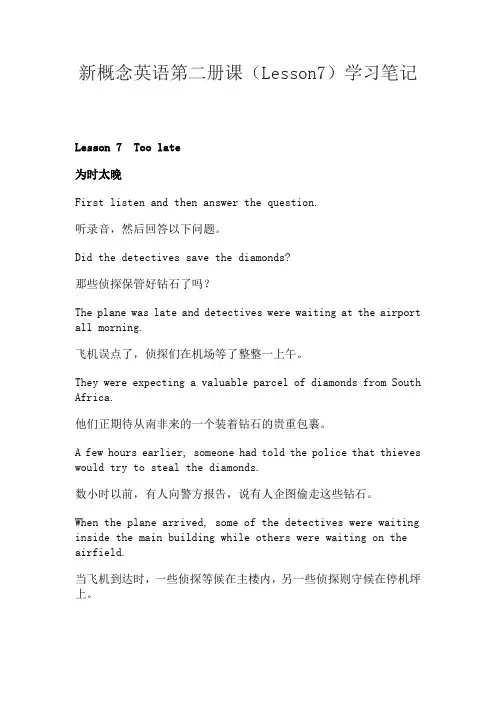
新概念英语第二册课(Lesson7)学习笔记
Lesson 7 Too late
为时太晚
First listen and then answer the question.
听录音,然后回答以下问题。
Did the detectives save the diamonds?
那些侦探保管好钻石了吗?
The plane was late and detectives were waiting at the airport all morning.
飞机误点了,侦探们在机场等了整整一上午。
They were expecting a valuable parcel of diamonds from South Africa.
他们正期待从南非来的一个装着钻石的贵重包裹。
A few hours earlier, someone had told the police that thieves would try to steal the diamonds.
数小时以前,有人向警方报告,说有人企图偷走这些钻石。
When the plane arrived, some of the detectives were waiting inside the main building while others were waiting on the airfield.
当飞机到达时,一些侦探等候在主楼内,另一些侦探则守候在停机坪上。
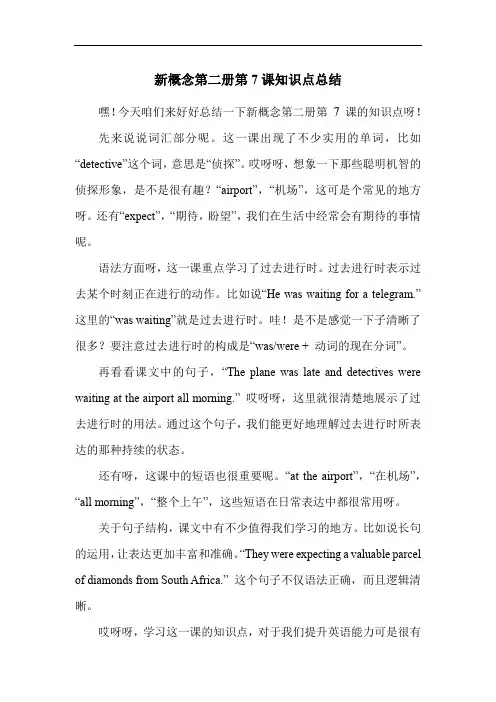
新概念第二册第7课知识点总结嘿!今天咱们来好好总结一下新概念第二册第7 课的知识点呀!先来说说词汇部分呢。
这一课出现了不少实用的单词,比如“detective”这个词,意思是“侦探”。
哎呀呀,想象一下那些聪明机智的侦探形象,是不是很有趣?“airport”,“机场”,这可是个常见的地方呀。
还有“expect”,“期待,盼望”,我们在生活中经常会有期待的事情呢。
语法方面呀,这一课重点学习了过去进行时。
过去进行时表示过去某个时刻正在进行的动作。
比如说“He was waiting for a telegram.” 这里的“was waiting”就是过去进行时。
哇!是不是感觉一下子清晰了很多?要注意过去进行时的构成是“was/were + 动词的现在分词”。
再看看课文中的句子,“The plane was late and detectives were waiting at the airport all morning.” 哎呀呀,这里就很清楚地展示了过去进行时的用法。
通过这个句子,我们能更好地理解过去进行时所表达的那种持续的状态。
还有呀,这课中的短语也很重要呢。
“at the airport”,“在机场”,“all morning”,“整个上午”,这些短语在日常表达中都很常用呀。
关于句子结构,课文中有不少值得我们学习的地方。
比如说长句的运用,让表达更加丰富和准确。
“They were expecting a valuable parcel of diamonds from South Africa.” 这个句子不仅语法正确,而且逻辑清晰。
哎呀呀,学习这一课的知识点,对于我们提升英语能力可是很有帮助的呢!我们要多做练习,加深对这些知识点的理解和运用。
再来说说这课的听力部分。
通过听力练习,我们能更好地熟悉单词的发音和句子的语调。
哇!这样对于我们的口语表达也会有很大的提升呀!在阅读方面,认真阅读课文,理解其中的意思,还能培养我们的阅读理解能力。
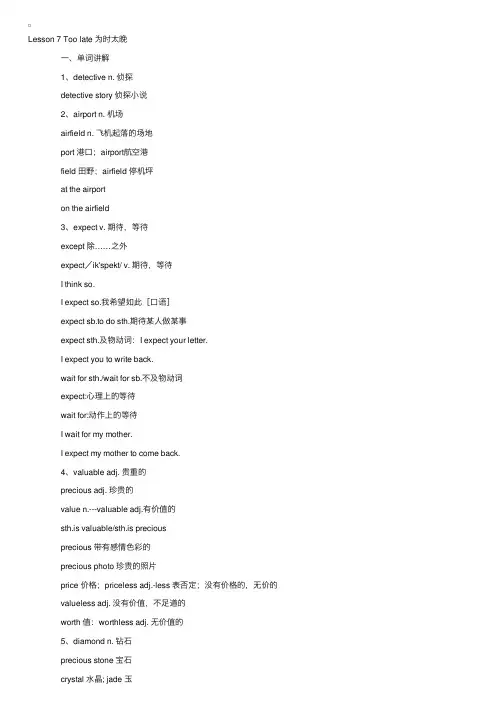
Lesson 7 Too late 为时太晚 ⼀、单词讲解 1、detective n. 侦探 detective story 侦探⼩说 2、airport n. 机场 airfield n. 飞机起落的场地 port 港⼝;airport航空港 field ⽥野;airfield 停机坪 at the airport on the airfield 3、expect v. 期待,等待 except 除……之外 expect/ik'spekt/ v. 期待,等待 I think so. I expect so.我希望如此[⼝语] expect sb.to do sth.期待某⼈做某事 expect sth.及物动词:I expect your letter. I expect you to write back. wait for sth./wait for sb.不及物动词 expect:⼼理上的等待 wait for:动作上的等待 I wait for my mother. I expect my mother to come back. 4、valuable adj. 贵重的 precious adj. 珍贵的 value n.---valuable adj.有价值的 sth.is valuable/sth.is precious precious 带有感情⾊彩的 precious photo 珍贵的照⽚ price 价格;priceless adj.-less 表否定;没有价格的,⽆价的 valueless adj. 没有价值,不⾜道的 worth 值:worthless adj. ⽆价值的 5、diamond n. 钻⽯ precious stone 宝⽯ crystal ⽔晶; jade ⽟ diamond ring 钻⽯戒指 6、steal v. 偷 steal,stole,stolen steal sth. 偷(某物) rob sb. 抢(某⼈) My wallet was stolen. I was robbed. rob the bank 7、main adj. 主要的 main building; main street main sentence; main idea 不与⼈连⽤ 8、guard n. 警戒,守卫 life guard 救⽣员/body guard 保镖 ⼆、语法重点--宾语 1、v.+prep.介词+宾语 come and look at... I am looking for... 2、 v.+prep. 介词/adv.代表不同的意思 look at 看;look after照料 3、v.+prep./adv.+宾语(n.) v.+宾语(n./pron.)+prep./adv. take off the coat……take the coat off/take it off coat n.作宾语 put on your shoes/put your shoes on/put them on 笔记: 宾语的位置和词性取决于施加动作的动词(在乐加乐学过新⼆的孩⼦应该知道宾语的构成和位⼦) 介词出现,⼀定要有宾语,所以 v.+prep.+宾语(n.) 副词可省略.v.+宾语(n./pron.)+adv. 或 v.+adv.+宾语(n.) at,after prep; off adv. vt.+宾语 vi.+prep.+宾语 take vt./look vi. I always take money with me. 附上及物动词和不及物动词讲解: A 有些动词只是及物动词; 它们不可以单独⽤,后⾯必须跟宾语。


新概念英语第二册第七课学习笔记Lesson 7 Too late为时太晚【New words and expressions】生词和短语(13)detective n. 侦探airport n. 机场expect v. 期待,等待valuable adj. 贵重的parcel n. 包裹diamond n. 钻石steal v. 偷main adj. 主要的airfield n. 飞机起落的场地guard n. 警戒,守卫sand n. 沙子stone n. 石子precious ['prɛʃəs] adj. 珍贵的★detective n. 侦探detective story 侦探小说★airport n. 机场★airfield n. 飞机起落的场地port 港口;airport 航空港at the airport 在机场field 田野;airfield 停机坪on the airfield 在停机坪上★expect v. 期待, 等待①vt.&vi. 预计,预料Jim has failed in mathematics as his teacher expected.正如他老师所预料的那样,吉姆数学考试没及格。
②vt. 等待,期待,盼望(心理上的等待)They are expecting guests tonight. 今晚有人要去他们那里作客。
expect所表示的等待一般暗含着根据某些信息或规律而作出相应反应的意思,而wait for 主要持续“等待”这个动作本身。
expect sth. I expect a letter from Jimmy.或“有的……,其余的……”one…the other…一个…另一个…some…others…一些…另一些…Some students are very hard-working, others are not.others=other+名词复数5、Two men took the parcel off the plane and carried it into the Customs House. Customs House 海关take sth. off…=take sth. away from…and carried it into… carried 表示看得很重6、While two detectives were keeping guard at the door, two others opened the parcel. To their surprise, the precious parcel was full of stones and sand!…were keeping guard at the door, two others opened the parcel.表面上是分工, 两个动作同时发生, 不是同时开始同时结束, 延续时间不一致, 长一点时间的动作用进行时态, 短时间的动作用过去时.When someone knocked at the door, I was having dinner.keep guard 守卫They kept a close guard over the thieves.at the door 在门边(固定搭配) two others=two other detectives to one's surprise,让某人惊讶的是To my surprise, the teacher was late. To one’s +表达人情绪的名词to one's joy [dʒɔɪ]欢乐,高兴To my joy, my mother came here yesterday.to one's excitement [ɪk'saɪtmənt]刺激;兴奋,激动To our excitement, our team wins.be full of ...装满My bag was full of books. The cup is full of water.【Key structures】过去进行时: 过去进行时的构成:be的过去式+现在分词过去进行时和一般过去时经常同在一个句子里使用。
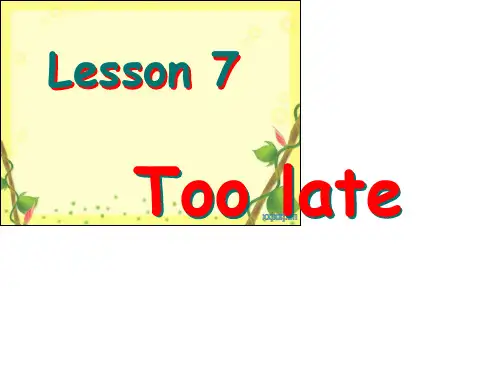
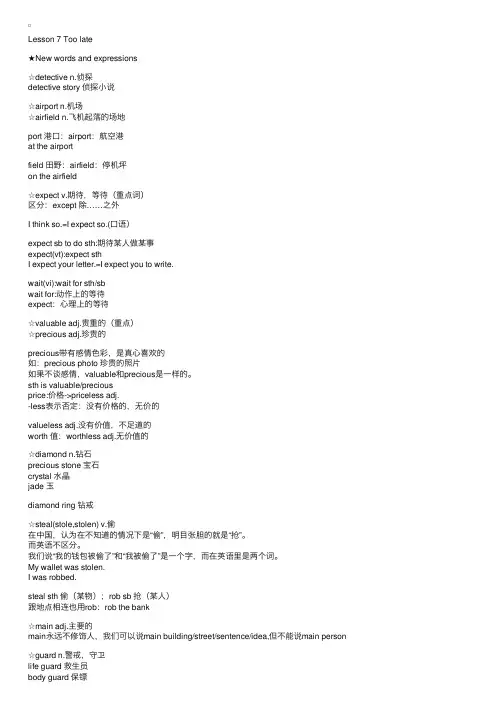
Lesson 7 Too late★New words and expressions☆detective n.侦探detective story 侦探⼩说☆airport n.机场☆airfield n.飞机起落的场地port 港⼝:airport:航空港at the airportfield ⽥野:airfield:停机坪on the airfield☆expect v.期待,等待(重点词)区分:except 除……之外I think so.=I expect so.(⼝语)expect sb to do sth:期待某⼈做某事expect(vt):expect sthI expect your letter.=I expect you to write.wait(vi):wait for sth/sbwait for:动作上的等待expect:⼼理上的等待☆valuable adj.贵重的(重点)☆precious adj.珍贵的precious带有感情⾊彩,是真⼼喜欢的如:precious photo 珍贵的照⽚如果不谈感情,valuable和precious是⼀样的。
sth is valuable/preciousprice:价格->priceless adj.-less表⽰否定:没有价格的,⽆价的valueless adj.没有价值,不⾜道的worth 值:worthless adj.⽆价值的☆diamond n.钻⽯precious stone 宝⽯crystal ⽔晶jade ⽟diamond ring 钻戒☆steal(stole,stolen) v.偷在中国,认为在不知道的情况下是“偷”,明⽬张胆的就是“抢”。
⽽英语不区分。
我们说“我的钱包被偷了”和“我被偷了”是⼀个字,⽽在英语⾥是两个词。
My wallet was stolen.I was robbed.steal sth 偷(某物);rob sb 抢(某⼈)跟地点相连也⽤rob:rob the bank☆main adj.主要的main永远不修饰⼈,我们可以说main building/street/sentence/idea,但不能说main person ☆guard n.警戒,守卫life guard 救⽣员body guard 保镖★TextThe plane was late and detectives were waiting at the airport all morning.They were expecting a valuable parcel of diamonds from South Africa.A few hours earlier,someone had told the police that thieves would try to steal the diamonds.When the plane arrived,some of the detectives were waiting on the airfield.Two men took the parcel off the plane and caried it into the Custom House.While two detectives were keeping guard at the door,two others opened the parcel.To their surprise,the precious parcel was full of stones and sand!☆someone had told...过去完成式,过去以前发⽣的事情...that thieves would try to...would+do:过去将来式,间接⽅式,转述,站在过去看未来☆when和while都表⽰当……的时候,考试时⼀定选whenwhile能⽤when代替,但是when却不⼀定能⽤while代替while+从句,动作⼀定会延续when+延续性动作/瞬间动词when he arrived/died⽤过去进⾏时:在过去的某⼀点时间,或者是过去某⼀动作同时发⽣的另外⼀个动作。
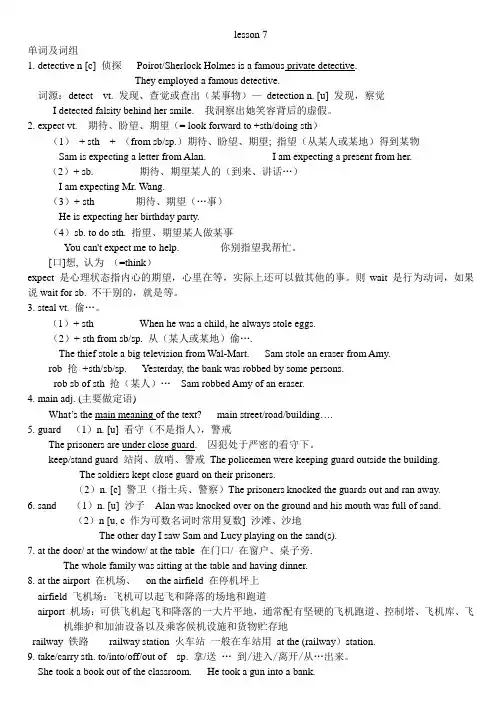
lesson 7单词及词组1. detective n [c] 侦探Poirot/Sherlock Holmes is a famous private detective.They employed a famous detective.词源:detect vt. 发现、查觉或查出(某事物)—detection n. [u] 发现,察觉I detected falsity behind her smile. 我洞察出她笑容背后的虚假。
2. expect vt. 期待、盼望、期望(= look forward to +sth/doing sth)(1)+ sth + (from sb/sp.)期待、盼望、期望; 指望(从某人或某地)得到某物Sam is expecting a letter from Alan. I am expecting a present from her.(2)+ sb. 期待、期望某人的(到来、讲话…)I am expecting Mr. Wang.(3)+ sth 期待、期望(…事)He is expecting her birthday party.(4)sb. to do sth. 指望、期望某人做某事You can't expect me to help. 你别指望我帮忙。
[口]想, 认为(=think)expect 是心理状态指内心的期望,心里在等,实际上还可以做其他的事。
则wait 是行为动词,如果说wait for sb. 不干别的,就是等。
3. steal vt. 偷…。
(1)+ sth When he was a child, he always stole eggs.(2)+ sth from sb/sp. 从(某人或某地)偷….The thief stole a big television from Wal-Mart. Sam stole an eraser from Amy.rob 抢+sth/sb/sp. Yesterday, the bank was robbed by some persons.rob sb of sth 抢(某人)…Sam robbed Amy of an eraser.4. main adj. (主要做定语)What’s the main meaning of the text? main street/road/building….5. guard (1)n. [u] 看守(不是指人),警戒The prisoners are under close guard. 囚犯处于严密的看守下。
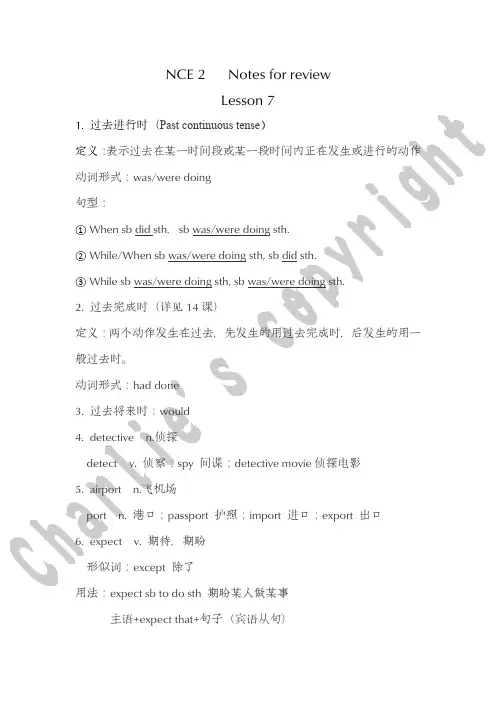
Lesson 7 Too Late过去进行时用法总结was/were+doing1.表示在过去某个时刻正在发生或进行的动作。
He was having breakfast at six o’clock yesterday morning. Were you at home at nine last night? Yes, I was watching TV.2.表示在过去某个时间段一直发生或进行的动作I first met Tom three years ago. He was working in a school at the time.在那时You didn’t go to Tom’s birthday party yesterday? No, I was looking after my little sister because my mother went to work.3.表示一个动作发生或进行时,另一个动作正在进行。
常用when/while/as引导在……时候I was doing my homework when my mother came in.Tom was sleeping in class while others were listening to the teacher carefullyAs I was walking on the street, I met my good friend, Tim.当两个动作同时发生时,延续性动作用过去进行时、短暂性动作用一般过去时•When/while/as都表示当……的时候, 区别在于:•while+从句,动作一定会是延续性的,过去进行时•While I was playing computer games, my mother camein.•when+从句,动作可为延续性动作或瞬间(短暂性)动作过去进行时、一般过去时•When Alice came in, we were playing games.•When we were having a walk in the square, it began to rain.•As+ 从句,动作也常为延续性动作过去进行时•As they were leaving, the postman arrived.•while 用在句子中间表示对比“而”•My mom was cooking while my Dad was watering the garden.。
新概念英语第二册复习笔记第七课单词学习detective n.侦探detect1) discover, recognize 发现(不好的事物),察觉2) investigate and solve (crime…) 侦察,侦查eg. A machine has been invented to detect gold. 已发明一种机器来寻找金子。
eg. Many machines have been used to detect the fatal virus.许多机器被使用来探测这种致命的病毒eg. The woman employed a private detective to detect her husband.那位女士雇用一名私家侦探来侦查她的丈夫。
detection n.发现,查明,查出the detection of a crime 破案detector n. 探测器detectable adj. 可发现的,可探知的detective n. 侦探employ a private detective 雇用一名私人侦探a detective novel 一部侦探小说a detective story 侦探故事airport n. 机场port 港口;港口城市passport 护照harbour 港湾,避难所Pearl Harbour 珍珠港pearl [pə:l] n.珍珠;珠状物;珍品airport (民航)飞机场airfield (小型)飞机场,飞机起落的场地,跑道railway station火车站terminal (铁路,公路等的)终点站tube station 地铁站(Br)(the underground railway station)a subway station 地铁站(U.S.)metro ['metrəu](尤指巴黎的)地下铁路n.+n.构成一个新名词:handbag 手提包water-gate 水门water bird 水禽,尤指淡水中的blood test 验血silkworm 蚕air 有关的合成词airsick 晕机的airplane 飞机(美)air raid 空袭airman 飞机驾驶员或乘务员airmail 航空邮件airtight 不透气的air-conditioner 空调expect1) 预料,认为,猜想eg. Who has eaten up the cake? 是谁把蛋糕吃光了?I expect/think/suppose it was Tom. 我认为是汤姆。
eg. Will you be late? 你会迟到吗?I don’t expect/think/suppose so. 我认为不会。
2) 期待,盼想eg. The children were expecting Christmas presents from their parents.孩子们正期待着父母的圣诞礼物。
eg. The detectives were expecting a parcel of diamonds from South Africa.侦探们正在期待着一包来自非洲的贵重的钻石。
3) 期望,乞求eg. You expect too much of your child.你对孩子的期望太高。
eg. You are expected to do your duty. 期望你完成职责。
as might be expected 或as might have been expected 按照所想eg. As might have been expected, he won the first prize.正如所预料的,他赢得第一名/得了一等奖。
be expecting (口语)怀孕与expect 相关的词expectancy [ɪk'spektənsi:]n. [U] 预料,期望life expectancy 平均寿命expectation [,ekspek'teiʃən](常用复数)(成功、幸运等的)期望;(尤指有继承遗产的)指望against all expectations 出乎意料beyond all expectations 出乎意料地(的)come up to a person’s expectations 正如所愿fall short of a person’s expectations 未能如愿,与期望有差距in expectations of 预计含有valuable1) of great value, worth or use 贵重的,值钱的a valuable parcel of diamonds 一包贵重的钻石expensive ←→cheap / inexpensiveeg. That painting is too expensive to buy. 那副画太贵了不能买。
dear 珍视的,价高的(常作表语)(Br.)eg. She lost everything that was dear to her. 她散失了所有宝贵的东西。
valuable 尤指在买卖中可带来高额利润的a valuable parcel of diamonds 一包贵重的钻石precious 珍贵的,宝贵的precious diamonds 极其珍贵的钻石precious moments together 在一起的宝贵时光eg. Life is precious. 生命是宝贵的。
eg. She is precious to him. 她对他来说是很重要的。
costly : costing much 昂贵的;贵重的a costly diamond necklace 一条贵重的钻石项链priceless 无价的a priceless jewel 极其昂贵的珠宝2) 很有用的,很有价值的valuable assistance 很有价值的辅助valuable information 极其有价值的信息valuable advice 有价值的建议valuable help 有价值的帮助value n. 价值be of great value to sb 对某人价值很高的be of little value to sb 对某人价值很低的be of some value to sb 对某人有一定价值的be of no value to sb 对某人无用eg. This advice is valuable to me. 这个建议对我很有用。
eg. This advice is of great value. 这个建议很有价值。
be valuable 相当于be of valuebe + of + 名词:表示具有某种属性eg. This information is important.or: This information is of importance. 这条信息很重要。
eg. This tool is useful.or: This tool is of use. 这个工具很有用。
parcel n. 包裹(特指邮包)eg. A parcel has just come, addressed to you. 一个邮包刚到,是你的。
package 指较大的包装eg. The package got torn on the way to the station. 包裹在去邮局的路上被撕坏了。
packet 能携带的小包;商品的小包装eg. Give this packet letters to the teachers. 把这包信交给老师。
a packet of cigarettes 一包香烟a packet of sweets 一包糖P.P →parcel post的缩写包裹邮递parcel 区划,小段a parcel of land 属于产业上的一片地diamond n. 钻石a diamond ring 一枚钻戒diamond wedding 结婚60周年或75周年纪念,钻石婚礼pearl 珍珠(precious) stone 宝石ruby ['ru:bi] crystal 红宝石emerald ['emərəld, 'emrəld] 绿宝石steal ( stole, stolen )1) steal sth from sb/stheg. He stole from the rich to give to the poor. 他劫富济贫。
eg. My wallet was stolen. 我的钱包被偷走了。
2) 把……(偷偷地)弄到手,神不知鬼不觉地取得eg. He stole her heart. 他在不知不觉间得到了她的爱情。
eg. She stole a glance at the man in the concert. 在音乐会上她偷偷地瞟了那个男士一眼。
3) steal out of ( the building ) 从建筑物里偷走thief 小偷theft 行窃,偷窃burglar 窃贼(尤指入室行窃的)burgle v. 闯入(建筑物)行窃robber n. 抢劫,强盗robbery n. 抢劫rob v. 抢劫rob Peter to pay Paul 拆东墙补西墙highwayman 路匪main 作定语(无比较级或最高级形式)the main street 主干道the main building 主楼the main idea of the passage 这篇文章的主题思想the main chance (赚钱,盈利等的)机会,可能性major 主要(重要之意)a major problem 一个重要/主要的问题airfield (小型)飞机场,飞机起落的场地guard1) [U] 警戒,看守,守望(的行为)be on guardkeep guardstand guard 站岗eg. Two detectives were keeping guard at the door. 两个侦探在门口守卫着。
2) [C] 警卫(尤指士兵,警察)body guard 保镖v.1) 看守,监视eg. The policeman guarded the prisoners. 警察看守囚犯。
2) 保护eg. A helmet guards your head against injuries. 头盔保护你的头部不受伤害。
helmet ['helmit] n.头盔precious adj. 珍贵的stone n. 石块;石子;碎石rock 岩石( precious ) stone 宝石;钻石eg. To kill two birds with one stone. 一石两鸟;一箭双雕within a stone’s throw 一箭之地stone-blind 完全瞎的stone-deaf 完全聋的sand n.1) pl. 沙地,沙滩eg. We walk on the burning sands of the desert. 我们走在沙漠上灼热的沙地上。